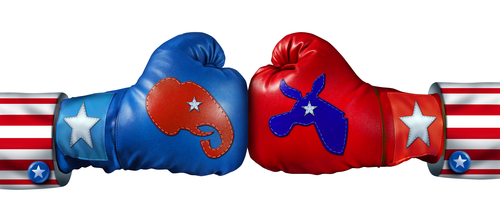Politics, Oh My!
Wow, after a brief social media post about DACA, I had a hailstorm of comments. Mostly folks who want to engage in the conversation, but two key thoughts about why we’ve become an apathetic country when it comes to politics arose from that thread. Here they are:
1) Americans don’t engage in political conversation because we don’t know how to interpret when others disagree with us.
2) We have opposing priorities, but the same end goal.
First we don’t engage in political conversation because we don’t know how to handle conflict well and when there is conflict, we don’t know how to interpret it. In the conversation thread, one dear friend of mine, who loves to egg people on for the sake of making them think, put out some fairly outlandish (even if true from his perspective) statements. That’s who he is and why I love him.
However, others on my feed don’t know this man. They don’t know his heart, they just see words. Since we don’t’ know either how to disengage from the personal aspect of conflict or we don’t feel confident in arguing through the written word, we just ignore it.
I’m usually among the first to avoid posting anything political for these very reasons. I even contemplated deleting the post to make others more comfortable and to protect my reputation. I opted not to because we need to learn this skill even if we are uncomfortable – especially if we are uncomfortable.
· As a society, we need to learn skills to have respectful conversations, to engage in ways that allow everyone to be heard and which create meaningful dialogue. This is a skill set, not a natural behavior for most of us. What can you do?
· Take a class on Crucial Conversations (or listen to the audio book).
· Watch others who are really good at handling conflict. Note what they do and practice those skills.
· Engage in friendly conflict with those you trust. Those who hearts are kind and genuine and who value others even when they disagree.
The second thing I think we often overlook in conflict is that we all want the same thing. We have different ways of achieving those things, but ultimately we all want the same thing. We want safety, freedom, stability, respect and dignity. However, we prioritize how to achieve those things differently. It’s how we prioritize them that drives us apart.
An easy example is airline security. We all want our planes to make it safely between airports. Some of us are okay having our baggage searched (a violation of privacy) for the sake of security. Others dislike the process because they prioritize dignity and feel there’s potential for racial profiling, a violation of that dignity. Others chose to drive (priority freedom) because they believe there’s better ways to find safety than through TSA checks.
How can we come together? That’s the question. World peace is probably not going to happen. It hasn’t yet in the history of humankind. However, I think a few things we can do are:
· Being thoughtful in how we engage in conflict
· Being aware of others’ needs and priorities
· Creating a safe space for conflict
· Learning new skills to be more effective when conflict arises
· Until we perfect how to have respectful conflict, I, personally ask for your grace and mercy, as I learn. I promise to extend the same to you.
Keynote speaker, trainer, and consultant, Sarah Gibson, helps organizations leverage the power of communication, teamwork and diversity to improve engagement and transform teams. To buy her book or inquire about her speaking programs, please visit www.sarahjgibson.com.




YOU MATTER SARAH